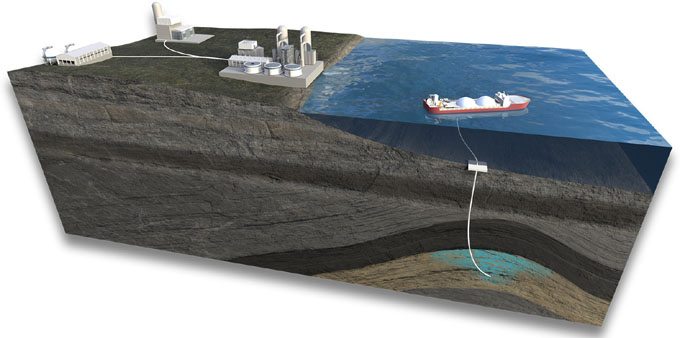
In a Nutshell
Carbon capture, utilization and storage (CCUS) is a collection of technologies that enable the mitigation of carbon dioxide (CO2) emissions from large point sources, such as power plants, refineries and other industrial facilities, or the removal of existing CO2 from the atmosphere. The captured CO2 can then be used, transported, or stored.
Behind the Science
The mobility and behaviour of CO2 in the subsurface has led to the identification of new carbon storage plays that are very different to those in the oil and gas world. A migration loss model leads to composite trapping through multiple mechanisms including: pore-scale capillary forces, dissolution trapping, cap rock rugosity and storage complex tortuosity. Modelling shows that such a saline aquifer play is extremely robust and that even large volumes have very low risk of migration out of the storage site. Even very minor heterogeneities such as small variations in grainsize will significantly divert CO2 migration – this can be used to advantage in storage sites. Legacy well penetrations are one of the principal leakage risks and will require much work by well engineers to identify and remediate. CCS projects across the world are rapidly developing beyond concept stage and there are optimistic discussions of projects including Endurance and Northern Lights in the UK and Norwegian sectors of the North Sea and Morecambe Net Zero in the Irish Sea.
In the News
In October 2024, the British government pledged nearly £22bn for projects to capture and store carbon emissions from energy, industry and hydrogen production. Sir Keir Starmer, who visited the north-west of England with Chancellor Rachel Reeves and Energy Secretary Ed Miliband to confirm the projects, said the move would ‘reignite our industrial heartlands’ and ‘kickstart growth’. Read more here
Meanwhile, in the USA, on 30 December, 2024, the U.S. Environmental Protection Agency (U.S. EPA) issued four Class VI permits for carbon dioxide (CO2) injection wells in California. These permits are the first such permits approved for California and the first for the EPA’s Pacific Southwest Region. Read more here
Training opportunities
GeoLogica are running a number of CCUS courses in 2025.
Reservoir Characterisation and Subsurface Uncertainties in Carbon Stores is a brand-new field trip with CCS expert and renowned tutor Richard Worden. Based in northwest Cheshire, the course will give participants the opportunity to see some of the rocks at outcrop that are planned UK CO2 storage sites.
Seals, Containment and Risk for CCS and Hydrogen Storage is a virtual class that examines the nature and properties of seals as they relate to containment for permanent storage of CO2 and cyclical storage of hydrogen and/or compressed air. Taught be Richard Swarbrick, it is a 3-day course comprising a mix of lectures, case studies and exercises.
Geochemical Effects of CO2 on Reservoir, Seals and Engineered Environments During CCS is a 5-day virtual course with Richard Worden. The reactions of CO2 with different reservoir rocks and top-seals, and their constituent minerals, and the cement and metal work used in the construction of wells are central to this course. Exercises will be used throughout the course; these will include calculations, largely based on spreadsheets, and quizzes will be used to test knowledge development.
KeyFacts Energy Industry Directory: GeoLogica l KeyFacts Energy news: Training
 KEYFACT Energy
KEYFACT Energy